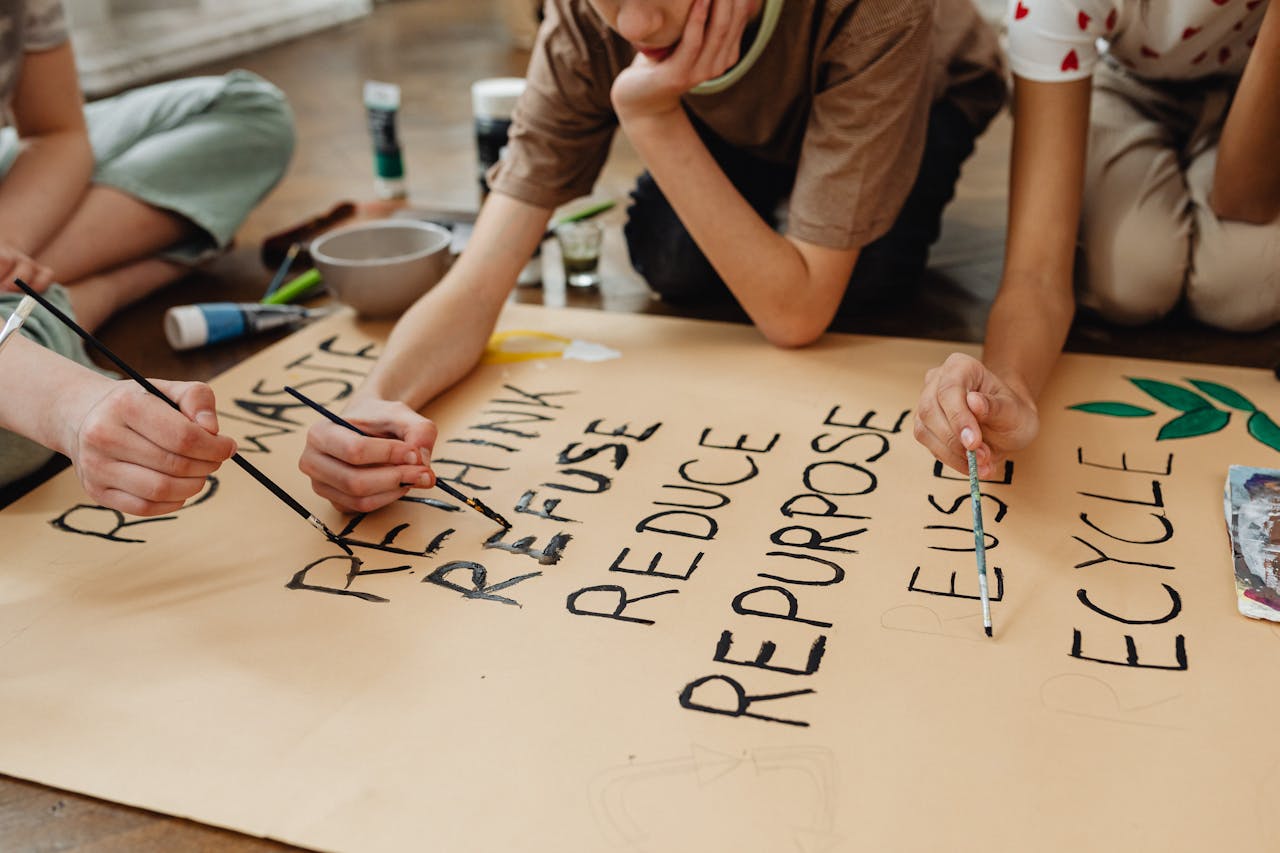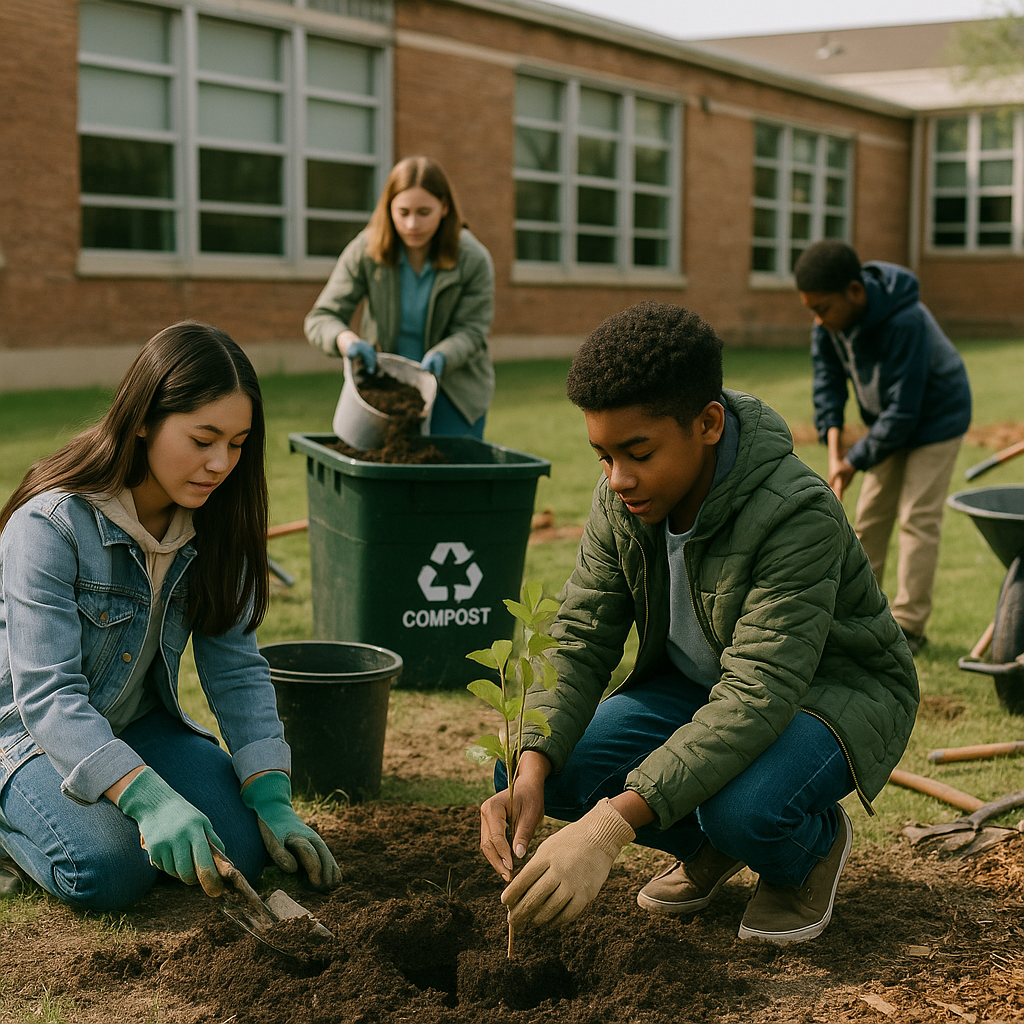5901 Botham Jean Blvd, Dallas, TX 75215
How to Encourage Recycling in Schools: An Introduction
May 25, 2025Schools lead the way in environmental change. As centers of learning and community, they provide an ideal foundation for instilling sustainable habits that students carry throughout their lives. When students learn proper recycling in their formative years, they develop environmental consciousness that extends beyond the classroom.
Recycling programs in educational institutions serve multiple purposes. They reduce the school’s ecological footprint by diverting waste from landfills and create hands-on learning opportunities about waste management. Most importantly, they empower young people to become environmental stewards who understand their role in protecting our planet’s resources.
The environmental impact of school waste is significant. With hundreds or even thousands of students generating waste daily through lunches, classroom activities, and administrative functions, schools can quickly become major contributors to local waste streams. By implementing effective recycling initiatives, schools can transform this challenge into an opportunity for meaningful environmental education and action.
What Educational Strategies Promote Recycling Awareness?
Interactive educational programs are effective tools for promoting recycling awareness in schools. When students engage in hands-on activities, they form stronger connections to environmental concepts. Schools can organize outdoor scavenger hunts where students search for and collect various recyclable items across the campus. This activity teaches students to identify recyclable materials while also reinforcing teamwork skills in an enjoyable way.
Inviting guest speakers from local recycling organizations provides students with real-world insights into waste management. These professionals can demonstrate sorting techniques, explain what happens to materials after collection, and answer students’ questions. Such interactions create memorable learning experiences that students retain more effectively than textbook information.
Field trips to recycling centers offer invaluable firsthand exposure to the recycling process. Seeing the journey of recyclable materials—from collection to sorting and processing—helps students understand the practical aspects of waste management. These excursions allow students to witness the volume of materials processed daily, highlighting the significance of their individual recycling efforts.
Cross-Curricular Integration
Incorporating sustainability lessons across various subjects creates a comprehensive understanding of recycling concepts. Science classes can explore decomposition rates of different materials or conduct experiments on transforming recycled paper into new products. Math lessons might involve tracking and graphing classroom waste reduction over time or calculating the environmental impact of recycling efforts.
Social studies can examine how different cultures approach waste management or how recycling policies have evolved. Language arts teachers might assign persuasive essays about recycling initiatives or creative stories featuring environmental themes. Art projects using reclaimed materials demonstrate creative reuse while producing tangible results students can proudly display.
Setting up clearly labeled recycling stations throughout the school reinforces daily habits. Student “green teams” can monitor these stations, educate peers about proper sorting, and track progress. This student leadership approach fosters ownership of environmental initiatives while developing valuable organizational skills.
Engaging Through Competition and Recognition
School-wide recycling competitions motivate students through friendly rivalry. Classrooms can compete to collect the most recyclables over a set period, with progress visibly tracked on charts in common areas. Recognition through certificates, small prizes, or special privileges acknowledges student efforts and encourages continued participation.
Digital technology enhances recycling education through interactive apps, online games, and virtual tours of recycling facilities. These resources make sustainability concepts accessible and engaging for tech-savvy students. Social media platforms also provide opportunities for schools to share successes and connect with wider environmental initiatives.
Sustainability workshops where students learn to repurpose materials into useful items demonstrate the creative potential of recycling. Projects might include crafting tote bags from old t-shirts, constructing bird feeders from plastic bottles, or transforming food waste into compost for school gardens. These activities show students that recycling extends beyond simply sorting trash.
The most effective educational strategies connect recycling to students’ daily lives rather than presenting it as an abstract concept. When students understand how their actions directly impact their community and environment, they develop lasting habits that extend beyond the classroom into their homes and future workplaces.
| Age Group | Recycling Education Method |
|---|---|
| Younger Pupils | Creative projects from recycled materials like bottle cap sculptures |
| Older Students | Prototypes for upcycled products, presented in a “Shark Tank”-style event |
| Elementary Students | Interactive curriculum like Recycle Right |
| All Students | Schoolwide recycling schemes with labeled bins and recycling ambassadors |
Through these multifaceted approaches, schools create not just temporary recycling programs but foster a generation of environmentally conscious citizens equipped with both knowledge and practical skills to address waste management challenges.
How Can Schools Engage the Community in Recycling Efforts?

Schools thrive when they extend recycling initiatives beyond campus boundaries. Community engagement multiplies the impact of school recycling programs and creates lasting environmental habits. Schools can implement several strategies to build community participation in their sustainability efforts.
Recycling competitions offer a dynamic way to energize the entire school community. Schools can organize contests between classes, grade levels, or even challenge other schools in the district. These competitions track recycling volumes over a set period, with visible leaderboards to maintain momentum. The competitive element motivates students while drawing in parents and community members to support their children’s efforts.
‘Trash to Treasure’ exhibitions showcase student creativity with recycled materials. These events display artwork, practical inventions, and other creations made from items that would otherwise end up in landfills. These exhibitions not only highlight student talent but also demonstrate the value of materials often considered waste.
Strategic partnerships with local businesses amplify recycling impact. Schools can collaborate with companies for recycling drive sponsorships, equipment donations, or technical expertise. Local recycling facilities can provide tours showing students and community members what happens to materials after collection. These partnerships create mutually beneficial relationships where businesses gain positive community exposure while schools receive valuable resources.
Environmental organizations offer another avenue for community connection. These groups can provide guest speakers, educational materials, and volunteer support for school recycling events. They often have established programs that schools can join rather than creating initiatives from scratch.
Parent involvement is essential for successful community recycling engagement. Schools can form parent recycling committees, host family recycling nights, or send home regular updates about recycling initiatives. When parents participate, students receive consistent environmental messages both at school and home.
Community clean-up days organized by schools create tangible environmental impact. These events bring together students, teachers, parents, and community members to collect litter and recyclables from neighborhoods, parks, or waterways. The visible results of these efforts demonstrate the community’s collective ability to improve local environments.
Creating Sustainable Partnerships
For recycling initiatives to succeed long-term, schools need stable community partnerships. Regular communication with partners ensures programs remain relevant and effective. Schools can recognize partner contributions through appreciation events, public acknowledgments, and sharing success stories.
Documenting successful partnerships provides valuable models for other schools. When schools share their community engagement strategies, the positive impact extends beyond a single institution.
Schools can maximize community engagement by creating clear roles for different participant groups. Students might lead educational components, parents could coordinate logistics, and local businesses might provide resources. When everyone contributes their strengths, recycling initiatives gain momentum.
Schools can also leverage digital platforms to expand community involvement. Social media campaigns, online challenges, and virtual workshops allow participation from those who cannot attend in-person events. These digital extensions create wider awareness and engagement opportunities.
By thoughtfully engaging the broader community, schools transform recycling from an isolated campus activity into a community-wide movement. These collaborative efforts create sustainable habits that extend far beyond school grounds, building environmental stewardship across generations.
Conclusion: Fostering a Culture of Recycling in Schools

Encouraging recycling in schools requires a committed effort from students, staff, and the wider community. By implementing effective recycling programs, offering engaging educational experiences, and fostering community involvement, schools can create a culture of sustainability that extends beyond the classroom. These efforts not only reduce waste but also empower students to become environmentally conscious citizens.
When schools prioritize recycling initiatives with strategically placed bins, student-led green teams, and curriculum integration, they lay the groundwork for lifelong environmental responsibility. The hands-on learning experiences and community partnerships formed through these programs help students understand the tangible impact of their actions on the environment. This practical education in sustainability prepares them to advocate for positive change in their homes and communities.
Is your school ready to transform its approach to waste management and sustainability? Contact Okon Recycling at 214-717-4083 for expert guidance on implementing effective recycling programs that will empower your students and contribute to a greener future.
